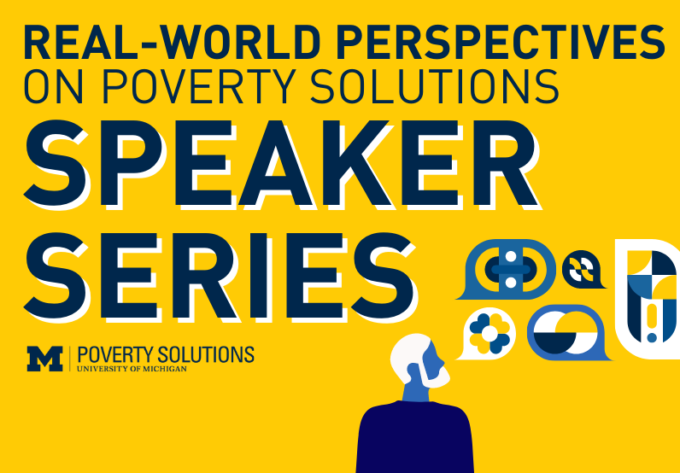Speaker series to cover reparations, human-centered design, health impacts of oppression

Contact: Karissa Knapp, ktknapp@umich.edu
ANN ARBOR—This fall, the Real-World Perspectives on Poverty Solutions Speaker Series will feature poverty experts in both policy and practice, who will explore critical issues like: the effects of systemic oppression on health, reforming public institutions through human-centered design, reparations, and financial empowerment in Detroit.
The series is hosted by Poverty Solutions at the University of Michigan, a university-wide presidential initiative that aims to prevent and alleviate poverty through action-based research.
U-M researcher Arline Geronimus, professor of health behavior and health education at the School of Public Health, will be starting the series on Friday, Sept. 22. Geronimus will share her research on the effects of systemic oppression on the body. Her book on the subject – Weathering: The Extraordinary Stress of Ordinary Life in an Unjust Society – came out earlier this year.
Poverty Solutions is partnering with various university departments to invite this diverse set of speakers to discuss different approaches to addressing poverty in this year’s seven-week series.
All events are free and open to the public, and will take place at noon on Fridays in room ECC 1840 at the School of Social Work, unless otherwise noted. U-M students can enroll in a course to earn one credit for attending the speaker series.
Here’s the speaker series lineup:
- Sept. 22 – “Weathering: The extraordinary stress of ordinary life in an unjust society” by Arline Gerominus, professor of health behavior and health education, School of Public Health, U-M.
- Sept. 29 – “The United States pays reparations every day—just not to Black America?” by Cornell William Brooks, Hauser Professor of the Practice of Nonprofit Organizations, professor of the practice of public leadership and social justice, Harvard University.
- Oct. 6 – “The power in a single story: Scaling social change by focusing on individuals” by Adam Selzer, co-founder and senior director of Civilla Detroit.
- Oct. 13 – “Chelsea Eats: Basic income and food security” by Jeff Liebman, director of the Taubman Center for State and Local Government; Robert W. Scrivner Professor of Social Policy, Harvard University.
- Special date and location: 12:30 p.m. Oct. 18 at the Michigan Union – “Incarceration and its aftermath: How art can create pathways to reintegration and healing” by Reuben Miller and Nicole Fleetwood, MacArthur Fellows. Miller is an associate professor of social work, University of Chicago, and Fleetwood is a professor of media, New York University.
- Oct. 20 – “Creating green energy and equitable enterprise in Detroit” by Jerry Davis, Gilbert and Ruth Whitaker Professor of Business Administration, professor of management and organizations, U-M Ross School of Business.
- Oct. 27 – “Creating moves to opportunity: Experimental and mixed methods evidence on neighborhood choice” by Stefanie DeLuca, James Coleman Professor of Sociology and Social Policy, Johns Hopkins University.
- Nov. 3 – Poverty Solutions alumni panel
